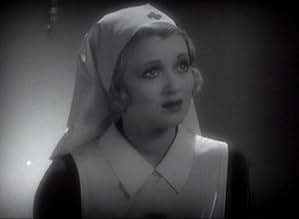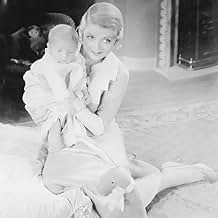A war officer who is thought dead returns to the woman he loves, only to find that she has remarried.A war officer who is thought dead returns to the woman he loves, only to find that she has remarried.A war officer who is thought dead returns to the woman he loves, only to find that she has remarried.
- Awards
- 1 win total
Daisy Belmore
- Tibbetts - Nurse
- (uncredited)
Billy Bevan
- Departing British Soldier
- (uncredited)
Edmund Breon
- Tom Kent
- (uncredited)
Eddy Chandler
- Captain Peters
- (uncredited)
Jay Eaton
- Dancing Doughboy
- (uncredited)
Bill Elliott
- Dancing Doughboy
- (uncredited)
Fred Esmelton
- Ponsonby's Butler
- (uncredited)
Mary Forbes
- The Duchess
- (uncredited)
Elizabeth Forrester
- Evelyn Kent
- (uncredited)
Robert Greig
- Hansom Cabby
- (uncredited)
Olaf Hytten
- Aide to Major General
- (uncredited)
Claude King
- Major General Visiting Hospital
- (uncredited)
Featured reviews
The first of four films Constance Bennett did with Joel McCrea was one that you'd
better bring the bath towels to the theater if you saw it. I'm sure even the men had
a tear or two seeing what Connie went through.
An American nurse in London during World War I Bennett has American ace Joel McCrea and stiff upper lip British major Paul Cavanaugh after her. She loves McCrea and can't see Cavanaugh.
But when McCrea gets shot down and goes missing in action she's very pregnant and the sympathetic Cavanaugh is ready to marry her and make her respectable.
The usual complications ensue after that and Bennett pays a heavy price for her romances.
Born To Love fits rater neatly into that category called women's pictures. Women who worried where the next meal might come from, plunked don their nickel and could sympathize with a woman like Bennett and her complicated romantic life.
For this type the film is OK, but I doubt we'll see a remake in this century.
An American nurse in London during World War I Bennett has American ace Joel McCrea and stiff upper lip British major Paul Cavanaugh after her. She loves McCrea and can't see Cavanaugh.
But when McCrea gets shot down and goes missing in action she's very pregnant and the sympathetic Cavanaugh is ready to marry her and make her respectable.
The usual complications ensue after that and Bennett pays a heavy price for her romances.
Born To Love fits rater neatly into that category called women's pictures. Women who worried where the next meal might come from, plunked don their nickel and could sympathize with a woman like Bennett and her complicated romantic life.
For this type the film is OK, but I doubt we'll see a remake in this century.
Constant Bennett is a beautiful Red Cross nurse and Joel McCrea her lover in "Born to Love." The story held my interest but it is truly a turgid melodrama with some very old-fashioned, over the top acting from Bennett.
Bennett and McCrea meet during World War I in London, fall in love, have sex; he leaves for battle and is later presumed dead. Pregnant, she marries Paul Cavanagh, Sir Wilfred Drake, who comes off like a nice guy at first.
When McCrea turns up again, Bennett is determined to be loyal to her husband. But when he realizes she's seen McCrea and is still in love with him, the jig is up. In the divorce, Sir Wilfred gets full custody of the child.
And here's where the going gets rough for the viewer, not to mention the characters! McCrea is adorable; Cavanagh is the type of leading man one doesn't see anymore. He comes off as very unattractive in this, though in his 32-year career, this often wasn't the case.
As for Bennett, one has seen her to much better advantage. This is one of those creaky movies that's interesting from a precode and artifact point of view, but you can see these two stars in better films.
Bennett and McCrea meet during World War I in London, fall in love, have sex; he leaves for battle and is later presumed dead. Pregnant, she marries Paul Cavanagh, Sir Wilfred Drake, who comes off like a nice guy at first.
When McCrea turns up again, Bennett is determined to be loyal to her husband. But when he realizes she's seen McCrea and is still in love with him, the jig is up. In the divorce, Sir Wilfred gets full custody of the child.
And here's where the going gets rough for the viewer, not to mention the characters! McCrea is adorable; Cavanagh is the type of leading man one doesn't see anymore. He comes off as very unattractive in this, though in his 32-year career, this often wasn't the case.
As for Bennett, one has seen her to much better advantage. This is one of those creaky movies that's interesting from a precode and artifact point of view, but you can see these two stars in better films.
Not uninteresting pre-Code soap suds, wherein Yankee nurse Bennett, in London (nice historical touch: a bus advertising "Chu Chin Chow") meets Captain Joel McCrea, they have a torrid romance and pledge their troth, and while carrying his child she hears he's dead. We know he's not--he's second-billed, and there's an hour to go--but she thinks he is, so she marries Paul Cavanagh on the rebound and we wait for the fireworks that will erupt when McCrea returns. Connie's histrionic- -she gets to love, yell, sob, scream, and put on a phony British accent, even though she's playing American--and Paul Stein's camera likes to linger on her overemoting. But Joel McCrea was certainly the personification of solid masculine American values circa 1918 or 1931, and his sincere underplaying nicely complements her overplaying. The screenplay doesn't hate her for having a child out of wedlock, and the happy ending isn't that happy. So, by 1931 standards, it's an adult movie. Just not a very good one.
It is WWI. Brooklyn gal Doris Kendall (Constance Bennett) meets American flyer Captain Barry Craig (Joel McCrea) during a Zeppelin attack in London. She is later told that he has been shot down and presumed dead. Her friend Sir Wilfred Drake (Paul Cavanagh) proposes marriage. She tells him that she's pregnant with Barry's baby. He marries her anyways. It turns out that Barry is still alive.
This is a rather boring story for the first hour. It's a lot of things that keep it that way. The movie makes a dramatic turn at around the hour mark. It needed the villainous turn to raise the intensity. By then, most of the audience has probably lost interest. Then it takes a dark turn that feels undeserved. I don't really understand Wilfred at that moment.
This is a rather boring story for the first hour. It's a lot of things that keep it that way. The movie makes a dramatic turn at around the hour mark. It needed the villainous turn to raise the intensity. By then, most of the audience has probably lost interest. Then it takes a dark turn that feels undeserved. I don't really understand Wilfred at that moment.
I saw the last part of this on TCM; it was Joel McCrea day.
It didn't really fit -- this is Constance Bennett's movie, 100%, and that's the problem. This has to be one of the worst performances of her career. Even making allowances for 1931, she is very histrionic and melodramatic, in all the worst, most silent-movie-cliché ways.
Technically, Paul L. Stein's direction is fine (for 1931), but it appears from this he was not an "actor's director". Oddly, Ms. Bennett's next film, "The Common Law," re-teamed her with director Stein and costar McCrea. It is better; not memorable, but at least she isn't painfully bad in this one.
It didn't really fit -- this is Constance Bennett's movie, 100%, and that's the problem. This has to be one of the worst performances of her career. Even making allowances for 1931, she is very histrionic and melodramatic, in all the worst, most silent-movie-cliché ways.
Technically, Paul L. Stein's direction is fine (for 1931), but it appears from this he was not an "actor's director". Oddly, Ms. Bennett's next film, "The Common Law," re-teamed her with director Stein and costar McCrea. It is better; not memorable, but at least she isn't painfully bad in this one.
Did you know
- TriviaThe first of four films co-starring Constance Bennett with Joel McCrea, the other three being The Common Law (1931), Rockabye (1932), and Bed of Roses (1933).
- GoofsIn an early sequence set in 1918, Constance Bennett is shown playing a phonograph record on the Victor label--but the label is the "scroll design" Victor didn't use until 1925.
- Crazy creditsDebut of actress Eily Malyon.
Details
Box office
- Budget
- $338,000 (estimated)
- Runtime
- 1h 21m(81 min)
- Color
Contribute to this page
Suggest an edit or add missing content









































